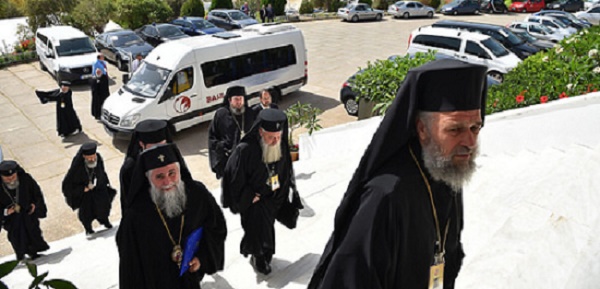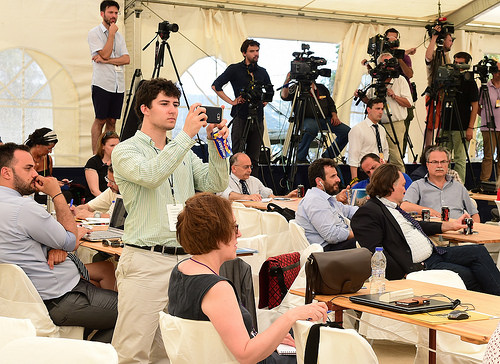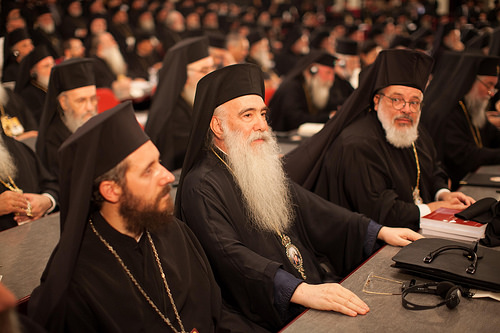In 1961, the preparation for a historical “Holy and Great” council was started. It was to be the Eighth Church Council. However, issues of faith lost out to issues of politics.
 The Primates of the Local Orthodox Churches and their delegations participate in the opening session of the Holy and Great Council of the Orthodox Church at the Orthodox Academy of Crete. / ROMANIAN ORTHODOX CHURCH/ROBERT NICOLAE.
The Primates of the Local Orthodox Churches and their delegations participate in the opening session of the Holy and Great Council of the Orthodox Church at the Orthodox Academy of Crete. / ROMANIAN ORTHODOX CHURCH/ROBERT NICOLAE.
The Eastern Day of Pentecost, June 19, marked the starting point of the Pan-Orthodox Council, a unique global assembly of Eastern Orthodox Church bishops, for the first time in 12 centuries.
The lengthy preparations for this notable forum began in 1961. The Holy and Great Council of the Orthodox Church is a synod of the bishops of all universally recognized autocephalous local churches of Eastern Orthodox Christianity. The original purpose of the summit was to examine current issues and to promote unity within Orthodox Christianity.
After a century full of duplicity and hearsay, Eastern Orthodox harmony has been hindered by the Soviet regime, by various wars, as well by internal preoccupations. Instead of promoting unity among Christians, the council on Crete turned into a showcase of apprehension, bickering and political hassle. Four out of fourteen Orthodox Churches boycotted the historical rally.
TENSION BETWEEN CONSTANTINOPLE AND MOSCOW
For the last two years, hundreds of theologians have formulated and compiled documents for the council. Bartholomew I, the Ecumenical Orthodox patriarch based out of Istanbul, and acknowledged “first among equals” among the heads of those 14 autocephalous churches, has championed the arrangements to make the summit happen.
Some observers have noted, however, that the Moscow Patriarch views Bartholomew as a rival and considers his push to organize the council as an attempt to establish authority. In addition, some Eastern circles express concerns that the meeting would pave way to closer ties with the Vatican and with Protestants. Such prospects sound terrifying to Russia’s conservative clergy. After the Ottoman conquest of Constantinople in 1453, Moscow has consistently attempted to position itself as “the true successor to the Byzantine church,” and “the New Rome.”
 Press Briefing on the second day of the Holy and Great Council. / DIMITRIOS PANAGOS
Press Briefing on the second day of the Holy and Great Council. / DIMITRIOS PANAGOS
STICKING POINTS AND DEMANDS
In November 2015, Turkey downed a Russian plane over its territory. As a result, Moscow Patriarch Cyril declared he would not go to the town of Istanbul (historically called Constantinople in Eastern Christianity), the then planned place of the summit. His ultimatum was accepted, and the meeting location was changed to Crete. This was one of several peremptory demands laid out by the Moscow Patriarchate.
In January 2016, fourteen Orthodox leaders met in Geneva to introduce corrections to the final papers and revisit the Council’s agenda. Bartholomew was cornered to concede to several Russian conditions. On each of these demands, Russian Patriarch Cyril had threatened to boycott the summit unless accepted:
- Changing the meeting place from Istanbul to the Island of Crete;
- Removing the matter of autocephaly from the agenda (despite the Ukrainian church’s hopes to have its independence discussed, according to The Economist);
- Changing the precondition for decision-making from majority vote to complete consensus.
11th HOUR REACTIONS
In the meantime, on June 1, the Bulgarian Orthodox Church unexpectedly opted to pull out from the council. The arguments: seating order in the meeting hall hinting of inequality among the 500 participants; proximity of Non-Orthodox observers and Non-Christian guests; lack of important topics on the council agenda; expressed disagreements by some autocephalous churches regarding texts that have already been approved; lack of opportunity to introduce any textual changes during the council’s proceedings; overall financial expenditures for the Bulgarian Church.
In addition, Bulgarian metropolitan Gabriel announced the national synod’s concern that the conference would indeed lay the foundation to promoting ecumenical relations with the Non-Orthodox Christian churches, considered “heretical or schismatic.” Apparently, the main point of vexation proved to be a document, entitled “Relations of the Orthodox Church with the Rest of the Christian World.”
Soon after Bulgaria, the autocephalous churches of Serbia, Georgia, and Antioch also pulled out of the council. The Serbian Patriarchate insisted on changing the council to “consultation.” The Georgian Church protested against the use of the word “churches” with regards to Protestant and Catholic “heretics.” Antioch sequentially expressed concerns over their rift with the Jerusalem Patriarchate and announced that unless it is healed, this would “deprive the council of its ecclesiological character and grant it an administrative quality, contradictory to the steadfast Orthodox synodical tradition.”
In addition, the Antioch Patriarchate insisted on the inclusion of more issues on the agenda: the possibility of unifying the date that the Orthodox celebrate Easter, the “challenges of the youth,” and “presenting a common witness in the world of today,” explains Sarah Eekhoff Zylstra in Christianity Today magazine (later, the Serbian Church reconsidered, and eventually joined the forum).
Two weeks after Bulgarian Patriarch Neophyte’s pullout, the Russian Orthodox Church also signaled its withdrawal from the council, explaining it would not attend unless all churches are present. Metropolitan (bishop) Hilarion, chairman of the Department of External Relations of the Russian Orthodox Church and a permanent member of the Holy Synod of the Patriarchate of Moscow, said, “We made a decision that we will not be able to take part in the all-Orthodox synod, if other churches do not go. All churches should take part, and only in this case the decisions of the assembly will be legitimate.”
Instead, Moscow bishop Hilarion made a public appeal to Patriarch Bartholomew to humble himself and postpone the council.
“The decision to stay away illustrates the fragmentation of Orthodox Churches, which are confined within their national borders,” Italian historian Andrea Riccardi, founder of the Sant’Egidio Movement commented. “On the contrary, the great dream of the Patriarch of Constantinople has always been to steer Orthodoxy away from traditionalism and nationalism. Bartholomew wants to relaunch Orthodox mission in the world, taking stock of the world’s problems and portraying the image of a united Church. The Russian vision, however, is restricted within its imperial confines.”
 The Primates of the Local Orthodox Churches and their delegations participate in the opening session of the Holy and Great Council of the Orthodox Church at the Orthodox Academy of Crete. / SEAN HAWKEY.
The Primates of the Local Orthodox Churches and their delegations participate in the opening session of the Holy and Great Council of the Orthodox Church at the Orthodox Academy of Crete. / SEAN HAWKEY.
COUNCIL IN SESSION
Moscow’s decision to withdraw from the proceedings raised concerns whether the summit would push through. The Russian Patriarchate represents 40 plus percent of all Orthodox Christians, embracing Russians, Ukrainians, Belorussians and others – i.e. about 130 million members out of a worldwide estimate of 300 million Eastern Orthodox believers.
Eventually, the assembly did launch. Ecumenical Patriarch Bartholomew said in his opening address, “This great and holy council will carry the message of unity. It will help to escape the deadlocks of the present.” The official web page of the summit, HolyCouncil.org, broadcasts live all deliberations and orations on a daily basis. According to Christian Today website, more than 1,000 Orthodox scholars and theologians urged the primates to hold the meeting despite the withdrawals.
SIX TOPICS SHORTLISTED
After half a century of consultations, the council topics (originally amounting to more than 100 issues) have been shortlisted by all 14 national churches down to six themes:
1. The mission of the Orthodox Church in the world today;
2. The Orthodox diaspora;
3. Autonomy and the means by which it is proclaimed;
4. The sacrament of marriage and its impediments;
5. The importance of fasting and its observance today;
6. Relations of the Orthodox church with the rest of the Christian world.
Some contentious issues that failed to be resolved in advance during the consultations (such as a synced common calendar, or the diptychs) were struck off the original agenda elaborated in 1976. As a result, the assembly is committed to operate solely on the shortlist of six issues. The complete texts of the pre-conciliar documents are published on the Council’s page.
The budget of the summit has amounted to 2.5 million Euro, including $1.5 million from US donors, informs Sputnik news agency. A significant part of the budget has been allocated to communications, transport and security measures. The council started on June 19 (the Orthodox day of Pentecost), and will close on June 27, 2016.
The resolutions of the council will be imperative for all 14 churches despite their participation in Crete. “It is a great council, a pan-Orthodox council whose decisions are binding for the Orthodox Church,” said John Chryssavgis, theological adviser to Patriarch Bartholomew. “No one, including the Ecumenical Patriarch, has the right to override that decision. There have been councils in the past attended by very few bishops or churches, because of various circumstances,” he said. “This council will be the largest, most representative council in the history of the Orthodox Church.”
FIRST SEVEN COUNCILS
The first seven church councils, held between 325 and 787, were meetings of bishops and scholars convened in order to reach a consensus on various heretical issues, and to promote Christian unity. All were held during the rule of the Byzantine Empire. The 1054 Schism later finalized a long existing split between Catholic and Eastern Orthodox Churches. Ever since that moment, Orthodox theologians have insisted that the Eastern branch is the true heir of the Apostolic Church, while other Christian groups, including Catholics and Protestants, are “schismatic and heretical” and will need to eventually return to “the one true faith.”

Las opiniones vertidas por nuestros colaboradores se realizan a nivel personal, pudiendo coincidir o no con la postura de la dirección de Protestante Digital.
Si quieres comentar o